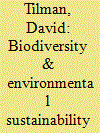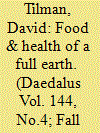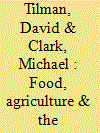|
|
|
Sort Order |
|
|
|
Items / Page
|
|
|
|
|
|
|
| Srl | Item |
| 1 |
ID:
116825


|
|
|
|
|
| Publication |
2012.
|
| Summary/Abstract |
Concern about the loss of Earth's biological diversity sparked two decades of research of unprecedented intensity, intellectual excitement, and societal relevance. This research shows that biodiversity is among the most important factors determining how ecosystems function. In particular, the loss of biodiversity decreases the productivity, stability, and efficiency of terrestrial, freshwater, and marine ecosystems. These research findings come at a time of rapidly increasing threats to global biodiversity resulting from agricultural land clearing, climate change, and pollution caused by globally accelerating demand for food and energy. The world faces the grand, multifaceted challenge of meeting global demand for food and energy while preserving Earth's biodiversity and the long-term sustainability of both global societies and the ecosystems upon which all life depends. The solutions to this challenge will require major advances in, and syntheses among, the environmental and social sciences.
|
|
|
|
|
|
|
|
|
|
|
|
|
|
|
|
| 2 |
ID:
141256


|
|
|
| 3 |
ID:
141257


|
|
|
|
|
| Summary/Abstract |
Secure and nutritious food supplies are the foundation of human health and development, and of stable societies. Yet food production also poses significant threats to the environment through greenhouse gas emissions, pollution from fertilizers and pesticides, and the loss of biodiversity and ecosystem services from the conversion of vast amounts of natural ecosystems into croplands and pastures. Global agricultural production is on a trajectory to double by 2050 because of both increases in the global population and the dietary changes associated with growing incomes. Here we examine the environmental problems that would result from these dietary shifts toward greater meat and calorie consumption and from the increase in agricultural production needed to provide this food. Several solutions, all of which are possible with current knowledge and technology, could substantially reduce agriculture's environmental impacts on greenhouse gas emissions, land clearing, and threats to biodiversity. In particular, the adoption of healthier diets and investment in increasing crop yields in developing nations would greatly reduce the environmental impacts of agriculture, lead to greater global health, and provide a path toward a secure and nutritious food supply for developing nations.
|
|
|
|
|
|
|
|
|
|
|
|
|
|
|
|
|
|
|
|
|